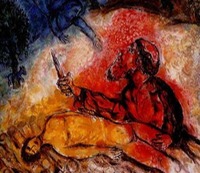Does God exist, and is God responsible for the evil in the world? What is the nature of religious experience, and can religious beliefs be justified without metaphysical evidence? How should we understand religion in terms of human existence in the world? And finally, what if religion is simply a sham? Questions like these - and there are many more - are about the philosophy of religion, and in this course we will explore them across numerous readings and one (somewhat) disturbing film.
In the first part of this course, we will consider some of the arguments for the existence of God: namely, the ontological argument, the cosmological argument, the teleological argument, and the moral argument. We will also watch a remarkable debate between William Lane Craig and Christopher Hitchens, both of whom know these arguments inside and out.
In the second part of this course, we will explore the philosophical and theological problem of evil, which has been a problem for religious people for millennia. We will read several essays, all of which deal with this problem differently, and we will discuss the pros and cons of the project of theodicy, which aims to save God from metaphysical criticism.
In the third part of this course, we will look at religious experience, starting with a selection from Blaise Pascal's Pensées. We will then read an abridged version of The Varieties of Religious Experience by William James - a classic work - and then watch The Rapture, a challenging film about a troubled woman who comes to believe that the world is coming to an end.
In the fourth part of this course, we will discuss religious existentialism. We will read Fear and Trembling by Søren Kierkegaard, in which the story of Abraham and Isaac is analyzed in terms of teleological suspension. We will then read I and Thou by Martin Buber, an admittedly difficult text that tries to break down human experience - from the mundane to the divine.
Finally, in the fifth and final part of this course, we will consider the possibility that religion is merely an illusion created by human beings in order to cope with a difficult and all-too-often dangerous world. Here we will read The Future of an Illusion by Sigmund Freud, which remains one of the most insightful and critical accounts of religion ever written.
These are the materials that we will cover:
THE EXISTENCE OF GOD
Video: "William Lane Craig vs. Christopher Hitchens"
THE PROBLEM OF EVIL
"The Concept of God after Auschwitz: A Jewish Voice by Hans Jonas; PDF
RELIGIOUS EXPERIENCE
Varieties of Religious Experience by William James; Amazon.com
Film: The Rapture
RELIGIOUS EXISTENTIALISM
Fear and Trembling by Søren Kierkegaard; Amazon.com
I and Thou by Martin Buber; Amazon.com
DENYING RELIGION
The Future of an Illusion by Sigmund Freud; Amazon.com
And here are some course-related media:
